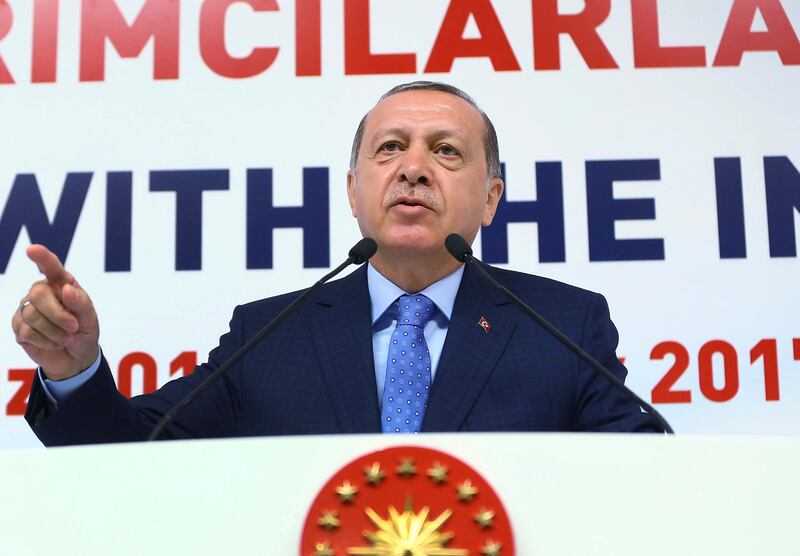Turkish president Recep Tayyip Erdogan on Wednesday ruled out an immediate end to the year-old state of emergency imposed after a failed coup, saying it could only be lifted once the fight against terrorism was finished.
Earlier on Wednesday, Turkish authorities detained 14 army officers and issued warrants for the detention of 51 people - including 34 former employees of state broadcaster TRT - for suspected links to the coup, local media reported.
"There can be no question of lifting emergency rule with all this happening," Mr Erdogan told investors in Ankara. "We will lift the emergency rule only when we no longer need to fight against terrorism. Lifting the emergency rule can be possible in the not-too-distant future."
He did not give a more specific time frame.
Ankara imposed the state of emergency soon after the coup attempt last July, when a group of rogue soldiers commandeered tanks, helicopters and warplanes and attacked parliament in a bid to overthrow the government, killing more than 240 people.
Since then, some 180,000 people have been sacked or suspended from the army, civil service and private sector and more than 50,000 detained over alleged links to the coup.
Emergency rule allows the president and cabinet to bypass parliament in passing new laws and to limit or suspend rights and freedoms as they deem necessary.
Critics say Mr Erdogan is using the measures to quash dissent, while the government says they are necessary because of the gravity of the security threats Turkey faces.
Prime minister Binali Yildirim said on Wednesday that the purges in the military were probably coming to an end.
Some 7,655 military personnel - including 150 generals and admirals and 4,287 officers - have been dismissed since the coup.
"The military purge has been largely completed by the dismissal of soldiers across all ranks. This struggle will continue until the last Feto member has paid the price for their treason," Mr Yildirim said.
Feto is the term the government uses for the network of the US-based Islamic cleric Fethullah Gulen it blames for the coup. Mr Gulen, who has lived in self-imposed exile in the US since 1999, has denied playing any role in the coup.
Speaking from his gated compound in Pennsylvania’s Pocono Mountains on Wednesday, Mr Gulen said he has no plans to flee the US and would accept extradition if Washington agrees to a request by Ankara to hand him over.
The 79-year-old cleric denied a Turkish government allegation from February that he was preparing to leave for Canada to avoid extradition.
"The rumours aren't true at all," he said, sitting in an ornate meeting room with walls lined with Islamic scripture. "If the United States sees it appropriate to extradite me, I would leave [for Turkey]."
Mr Erdogan said in May he would pursue "to the end" Turkey's demand for the extradition of Mr Gulen, who denies any involvement in the coup attempt. But there has been little or no concrete progress on the Turkish request.
US officials have said privately that even though Mr Erdogan has appealed directly to president Donald Trump on the matter, Turkey has yet to provide enough evidence for the justice department to act.
The issue has been a major sticking point in the relationship between the two Nato allies.
Mr Gulen said he hoped the Trump administration would not allow his extradition to move forward, especially after the resignation of former national security adviser Michael Flynn, a White House aide who quit just weeks after the US president's inauguration.
Mr Flynn, who resigned over his failure to disclose the extent of his contacts with Russia, had performed paid lobbying work that "could be construed to have principally benefited" the Turkish government, according to his lobbying registration filings. He was also outspoken in favour of Mr Gulen's extradition.
The cleric said he felt "pity" for Mr Flynn but acknowledged that the former Trump aide's departure might have helped his case.
Mr Gulen, a former ally of Mr Erdogan, has lived in self-imposed exile since 1999, presiding over what he says is a humanitarian religious movement. His followers operate a global network of schools and businesses that has been linked to the movement.
His network was declared a terrorist group by Turkey's national security council two months before the failed coup. Since then, Mr Gulen himself has become an increasingly marginalised figure across the political spectrum.






